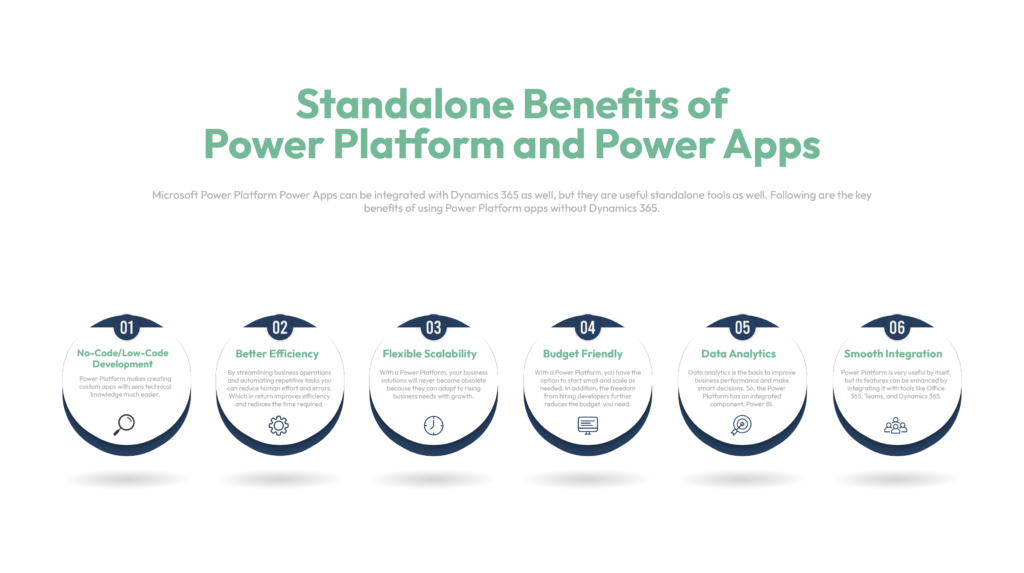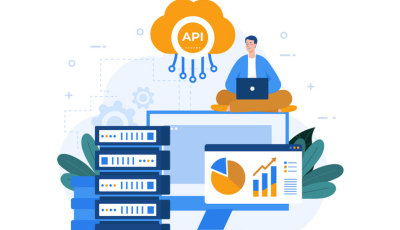Today’s business world is swift and rapidly evolving. To stay in business and cater to your audience’s needs, businesses need smart solutions. So, streamlined processes, decision-making based on data, and minimal manual efforts are the keys to achieving business growth. This is where Microsoft Power Platform and Power Apps can be utilized to elevate business standards.
Power Platform apps provide tools to streamline operations and unlock efficiency for startups and enterprise-level organizations alike. From automation to building custom applications, satisfying specific business requirements will not be a challenge anymore.
In this blog, we will discuss the Power of Microsoft Power Platform and Power Apps. Further, explore their benefits and how these apps can be used for business transformation. Specific topics like licensing options, compliance with Dutch regulations, and ease of deployment are also discussed.
What is Microsoft Power Platform?
Power Platform apps is a Platform designed to create tailored solutions for business problems instantly. Here are the four main products of Microsoft Power Platform: Power Apps, Power Automate, Power BI, and Power Virtual Agent.
These can be integrated with Microsoft Dynamics 365 crm and Business Central, used collectively, or as standalone products. These tools help create custom apps, automate workflow, analyze data, custom and automated reporting, and AI-powered solutions without coding knowledge.
Core Components of Power Platform
Here are the details and information on each core component and its purpose.
1. Power Apps is a tool for creating customized applications for specific business challenges tailored specifically to solve them.
2. Power Automate is a Powerful tool designed to create automation in workflow reducing manual labor, and repetitive tasks, and minimizing errors.
3. Power BI is a business intelligence tool used to visualize data and analytics, making the information easier to understand and view.
4. Power Virtual Agents are used to create AI-powered chatbots mainly used for improving customer engagement and offering better experiences for lasting relations.
Why does a business need Microsoft Power Platform Apps?
The main reason why businesses need Power Platform apps is to have access to rapid app development and automation tools to solve business challenges. This will help businesses by enabling them to address problems faster and more efficiently. While the reason a business chooses to adopt a Power Platform can be niche. But overall, they adopt it to streamline business operations, improve customer and employee experiences, and enable themselves to understand data better and make decisions rapidly based on it.
Should you switch to Power Platform Apps?
Power Platform Power Apps are suitable for all sizes of businesses and all types of industries. Are you a small startup business looking to automate tools to reduce workload? Yes, Power Apps are a very suitable and smart choice for you. Or, are you a large conglomerate searching for solutions to simplify complex processes, Power Platform has the right solutions for you as well. IT professionals, business analysts, and non-developers who want to create custom apps, analyze reports, or create low-code and no-code apps – Power Apps are for everyone.
What are Power Apps?
Power Apps are a component of the Power Platform. It is Powerful and useful. It allows anyone to create highly customized applications tailored to address specific needs without coding. Due to its low-code and no-code features, anyone can create innovative apps to improve efficiency and solve challenges.
What are the benefits of Power Apps?
Here are the key benefits businesses can enjoy if they adopt Power Apps
- With Power Apps, businesses can create custom applications and easily deploy them without the need for coding teams.
- Budget relief is due to less reliance on expensive software development and the need to hire development teams.
- Power Apps allows for rapid application creation and deployment, taking only a few weeks compared to months or even more than a year for custom software development.
- Create highly scalable business solutions that adapt according to changing business needs.
Type of software Microsoft Power Platform Power Apps can create
Businesses can utilize Power Apps to create diverse applications for unique needs. From data-centric processing apps to highly customized canvas apps anything can be created with an intuitive and user-friendly interface. Another added benefit is the smooth and seamless integration of other Microsoft products for enhanced collaboration and communication between systems.
1. Canvas Apps: These apps are perfect as they are highly user-friendly and focus on specific business needs. They can be customized however you like with ease due to the drag-and-drop functionality. Time tracking, business management, and fleet management are a few examples.
2. Model-Driven Apps: These apps are data-centric and work with Microsoft Data verse. So, these are perfect for managing complex and data-related business processes. Common examples of these are customer relationship management apps, inventory management, and employee onboarding apps.
3. Portal Apps: These types of apps are for the customer end and other stakeholders. Think of them as self-service portals where users can easily have access to information they need and can request other services like employee information portals. For example customer feedback and employee information & leave submission portal.
Power Apps can be used to address a wide range of business needs.
Components of Power Apps
Microsoft PowerApps has a ton of features making it a highly useful and Powerful low-code/no-code app development Platform offering both ease and efficiency. Here are its main components:
- Connectors allow a seamless connection between different apps and systems, integrating data sources from sources like SharePoint, SQL, and Dynamics 365. Thus, allowing collaboration between systems faster.
- Templates are very useful for situations where you have to create apps for common use cases. For instance expense tracking or project management apps, making app creation faster and easier.
- AI Builder is a feature that enhances the capabilities of your applications. With the help of AI you can process information faster, do sentiment analysis, and detect anomalies before they cause a problem.
Standalone Benefits of Power Platform and Power Apps
Microsoft Power Platform Power Apps can be integrated with Dynamics 365 as well, but they are useful standalone tools as well. Following are the key benefits of using Power Platform apps without Dynamics 365.

1. No-Code/Low-Code Development
Power Platform makes creating custom apps with zero technical knowledge much easier. Thus, making app development and problem-solving accessible, which makes businesses rely less on IT.
2. Better Efficiency
By streamlining business operations and automating repetitive tasks you can reduce human effort and errors. Which in return improves efficiency and reduces the time required. For example, by automating invoice processing you improve accuracy and user experience.
3. Flexible Scalability
With a Power Platform, your business solutions will never become obsolete because they can adapt to rising business needs with growth. You can easily adjust them and scale them according to your needs.
4. Budget Friendly
With a Power Platform, you have the option to start small and scale as needed. In addition, the freedom from hiring developers further reduces the budget required to implement the solutions you need. Furthermore, adopting a Power Platform reduces the workload on the IT team and eliminates the need for custom software.
5. Data Analytics
Data analytics is the basis to improve business performance and make smart decisions. So, the Power Platform has an integrated component, Power BI, which helps in data visualization and provides advanced analytics tools.
6. Smooth Integration
Power Platform is very useful by itself, but its features can be enhanced by integrating it with tools like Office 365, Teams, and Dynamics 365. The integration ensures a rise in productivity and communication between systems.
Power Platform for Dutch Businesses
Here is how a Power Platform can help businesses with licensing and compliance with local laws.
1. How Can Power Platform Improve Business Processes in the Netherlands?
Compliance with Local Laws and Regulations
Dutch businesses have to follow local, GDPR (General Data Protection Regulation), Dutch tax laws, and industry-specific rules. Power Platform can assist with compliance in the following ways.
- GDPR Compliance
By using Power Apps, Dutch businesses can create a custom app that collects data and formats it according to GDPR requirements.
- Tax Regulations
Businesses can create tailored apps for automatically calculating tax and generating reports that follow the Dutch tax laws.
- Industry-Specific Rules
To follow and comply with different industry rules and regulations Power Apps allow businesses to create separate tailored apps that cater to different regulations.
Licensing Options
Microsoft Power Platform apps offer flexible licensing options that make licensing easier according to business requirements and make it a budget-friendly solution.
- The Per User Plan is a great deal for startups or individuals who want to access and leverage the power of Microsoft Power Platform Power Apps.
- Per App Plan is another option where users only have to pay according to the apps they need access to. For example, a business will only incur charges if it solely requires Power for automation.
- Power Platform Premium is a premium payment plan based on a per-user license. It unlocks the full spectrum of capabilities the Power Platform has to offer. Its main features include creating modern apps, and access to unlimited websites, including premium connectors, advanced AI builder, and database connections.
Sustainability & Environmental Compliance
Businesses and governments are becoming increasingly concerned about sustainability and environmental compliance. So, Power Platform can help businesses comply with these regulations by tracking their carbon footprint and carbon emissions. Intelligently manage and monitor energy resources as well as identify areas where less energy can be consumed. Track and reduce waste to fulfill environmental regulations without impacting overall business efficiency.
2. How Can Dutch Businesses Leverage Power Apps for Automation?
Here are a few ways Dutch businesses can use Power Platform apps for automation and benefit their businesses.
Provide a better customer experience
By building customer portals and AI-powered chatbots, and performing targeted marketing, businesses can provide better and tailored customer experiences.
Customer portals can provide self-service so customers do not have to wait. AI Powered chatbots provide 24/7 customer response without delay resulting in higher customer satisfaction. Personalized marketing campaigns can address the pain points of the target audience and increase ROI.
Streamlined Management
Power Platform Power Apps can be used to optimize operations by automation, here are a few examples:
- Real-Time Tracking
Using Power Apps and Power Automate businesses can create workflows that automatically get approvals, submit requests, and build apps for tracking inventory.
- Supplier Management
Communicating with suppliers timely for inventory management ordering and tracking performance is another benefit.
- Demand Forecasting
Power BI can be used to predict future demands based on previous data and performance, ensuring the inventory is optimal for future needs.
3. How to Customize Power Apps to Comply with Dutch Regulations
Data security and privacy
Data security is a priority for Dutch law compliance especially GDPR, so Power Platform apps provide robust security through:
- Role-based access control to restrict access for non-authorized users protect sensitive information users and grant permissions based on job role.
- Data Loss Prevention (DLP) Policies are held in place to prevent sensitive information and important data from being shared outside of an organization’s network.
- Encryption of data using advanced methods and secret keys protects it and gives access to only authorized personnel to decrypt with the correct key and get the information required.
Integration with Dutch Banking and Financial Systems
Power Platform can be used for integration with external systems like local banks. This helps the business to automate payments, reconciliation, and generate invoices. Businesses can also monitor financial performance and create automated reports through custom dashboards. AI-Power can detect anomalies and prevent fraud in financial transactions.
4. How Easy is it to Deploy a Power App for a Dutch Business?
Deploying Power Platform Apps is simple and can be done as follows:
1. Build the app you require with an intuitive drag-and-drop feature.
2. Test the app in an environment to ensure everything is working perfectly and all Dutch regulations are being followed.
3. Deploy the app by releasing it onto your organization’s system.
4. Monitor for any errors and improvements then fix those, and redeploy.





